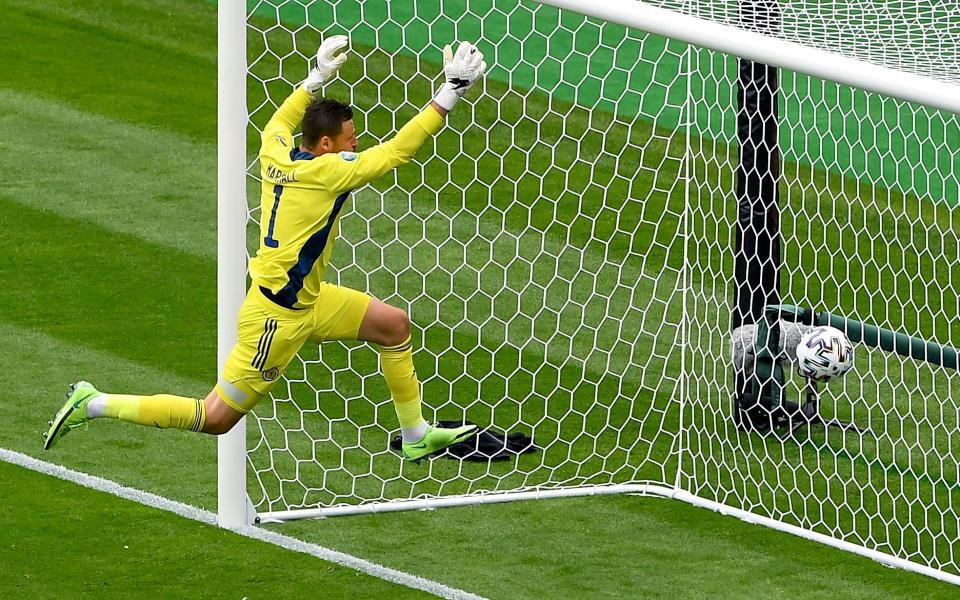Patrik Schick's wondergoal: Why goalkeepers stand so far off their line - and why it is worth it

Goalkeepers have always tended to believe there is strength in a union, and while most of European football could not fathom why David Marshall was running back into his area rather than standing in it when Czech Republic scored their second goal on Monday, his fellow members were expressing their sympathy.
Marshall is not the first goalkeeper to watch the ball sail over his head, a look of despair with a sprinkle of fear etched on to his face as he realised he was not going to get to Patrik Schick’s audacious, curling, long-range effort as it dropped into the empty goal.
Even in the seconds after that, as he lay tangled in his own net and the Czech Republic players screamed their delight at his misfortune as well as the magnificence of Schick’s finish, Marshall would have known he was getting the blame.
After all, goalkeepers are supposed to play in goal. The clue is in the name. They are there to keep the ball out of the goal. It is the most important thing they do.
Yet, goalkeepers wandering outside of the area when their team is attacking, particularly at set pieces, is nothing new.
It has been going on for years, even before you had players like Manchester City’s Ederson and Liverpool’s Allison Becker who can pass a ball almost as well as they can stop one.
Marshall’s positioning may seem strange, but Scotland were trying to build up pressure on the Czech Republic defence as they chased an equaliser and the goalkeeper moved out of his area to stop the opposition releasing it by booting the ball clear for their attacking players to run on to.
It is not a revolutionary idea, and not even a particularly unusual one, and as one current goalkeeper who wished to remain anonymous told Telegraph Sport, “the goalie gets the blame but what was he (Jack Hendry) doing trying to shoot from 30 yards with a crowd of players in his way? That was what caused Marshall problems. It was a sucidal shot from the position he was in.”
Another of those who speak with an expert eye, the former Newcastle United goalkeeper Steve Harper who is now Northern Ireland’s goalkeeping coach, explained: "It is about countering the counter attack.
“That’s why they do it. It is part of modern goalkeeping, play high up the pitch in support of your defence. You are there to recycle possession quickly if the opponents kick it clear, it is an attacking form of defence, meaning you can counter attack teams who are looking to counter attack you.
“Marshall was caught out because of a very unlucky ricochet from a Scotland shot and it was a freak, world class finish.
“You have to balance the potential risks versus the potential rewards and at 1-0 down, Scotland needed to try and put pressure on the Czechs.
“The fact these goals are still so rare, yet goalkeepers regularly stand where Marshall was on the pitch, shows the risks are low. In that situation, I don’t think blame can be attached to Marshall. It’s just one of those very unlucky things that happen to you sometimes as a goalkeeper. I don’t attach any blame to David.”
Harper knows that better than most after he was also beaten by a long range chip by Liverpool’s Xabi Alonso in September 2006 when he was caught standing further up the pitch. Harper played 273 first team games and spent 18 years as a player at Newcastle before ending his career at Hull City, and he is still reminded of it far too regularly for his liking.
But while Marshall may have received most of the criticism, he was outside of his area - knowing he could be exposed - because that is what he and presumably his coaching staff thought was the best way to help the team to score an equaliser.
Was he unlucky? Yes. Will he feel embarrassed? Sure. But mainly he will wish he had been standing two metres closer to his own goal when Schtick spotted him a long way off his line.
If you think goalkeepers should not venture outside their area unless by mistake or absolutely necessary to clear a loose ball, you have to understand this was not a dereliction of duty, but that the game has simply moved on without you.

 Yahoo Sport
Yahoo Sport 





































